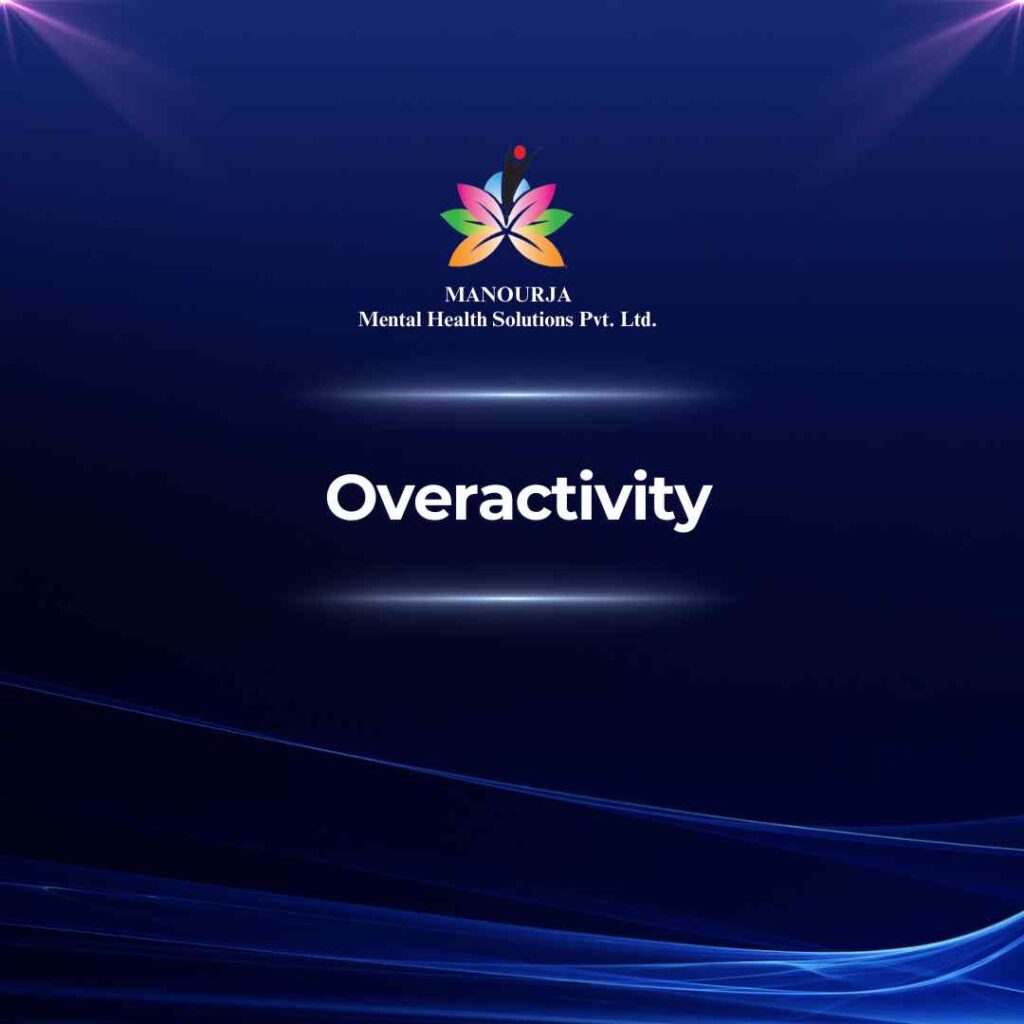Overactivity

“Overactivity” refers to excessive or heightened levels of physical or mental activity that exceed what is considered typical or appropriate for a given situation. It can manifest in various forms, including increased energy levels, restlessness, impulsivity, and a reduced ability to sit still or focus on tasks.
Overactivity as a Sign and Symptom of Mental Illness
Overactivity can be a symptom of several mental health disorders, often reflecting underlying disturbances in mood, cognition, or impulse control. It can significantly impact daily functioning, relationships, and overall well-being.
Mental Illnesses with Overactivity as Symptoms
Overactivity can occur in several mental health conditions, including:
- Mania or Hypomania: In bipolar disorder, individuals experiencing a manic or hypomanic episode may exhibit overactivity as part of their elevated mood. They may feel restless, have increased energy levels, engage in goal-directed activities without regard for consequences, and experience a reduced need for sleep.
- Attention-Deficit/Hyperactivity Disorder (ADHD): Hyperactivity is a core symptom of ADHD, where individuals may display overactivity, impulsivity, and difficulty maintaining attention and focus. This can affect both children and adults.
- Substance Use Disorders: Intoxication with stimulant substances, such as cocaine or amphetamines, can lead to overactivity, increased motor activity, and restlessness.
- Anxiety Disorders: Some individuals with anxiety disorders may exhibit overactivity as a manifestation of heightened arousal or distress. This can include pacing, fidgeting, or engaging in compulsive behaviors to reduce anxiety.
- Psychotic Disorders: In some cases, overactivity can occur in psychotic disorders, such as schizophrenia, where individuals may display agitation, pacing, or purposeless movements as part of their disorganized behavior.
- Disruptive Behavior Disorders: Children and adolescents with disruptive behavior disorders, such as oppositional defiant disorder or conduct disorder, may exhibit overactivity as part of their disruptive and impulsive behaviors.
- Personality Disorders: Certain personality disorders, such as borderline personality disorder (BPD), may involve periods of impulsivity and overactivity, particularly during episodes of emotional dysregulation.
Managing and Treating Overactivity
Treatment for overactivity focuses on addressing the underlying cause and helping individuals manage symptoms effectively:
- Medication: Depending on the diagnosis, medications such as mood stabilizers, stimulants (for ADHD), antipsychotics, or other psychotropic medications may be prescribed to reduce overactivity and improve symptom control.
- Behavioral Therapies: Cognitive-behavioral therapy (CBT), behavior modification techniques, and skills training can help individuals develop coping strategies, improve impulse control, and manage hyperactive behaviors.
- Environmental Modifications: Creating structured routines, providing outlets for physical activity, and minimizing distractions can help reduce overactivity and promote better self-regulation.
- Supportive Interventions: Educating individuals and their families about the nature of overactivity, providing support, and fostering a supportive environment can enhance treatment outcomes and overall well-being.
Recognizing overactivity as a symptom of an underlying mental health condition is crucial for accurate diagnosis and effective treatment planning. Addressing overactivity can help individuals regain control over their behaviors, improve functioning, and enhance quality of life.
At MANOURJA, we believe in the transformative power of counseling. Our experienced therapists offer a safe and supportive space where you can explore your thoughts, emotions, and challenges. Through personalized counselling sessions, we’ll work together to develop coping strategies, build resilience, and achieve lasting positive change. Discover the path to a healthier, happier you with MANOURJA counselling services.
MANOURJA Rehabilitation Services
At MANOURJA, we’re dedicated to helping you in rebuild your life, after difficult times. Our rehabilitation services focus on understanding what you need to move forward, whether you’re recovering from addiction, trauma, or any psychological – social challenges. We create personalized plans, that are all about helping you, regain your strength and find hope again. With a caring team by your side, you’ll have the support to make real progress and take steps toward a brighter, healthier future.
